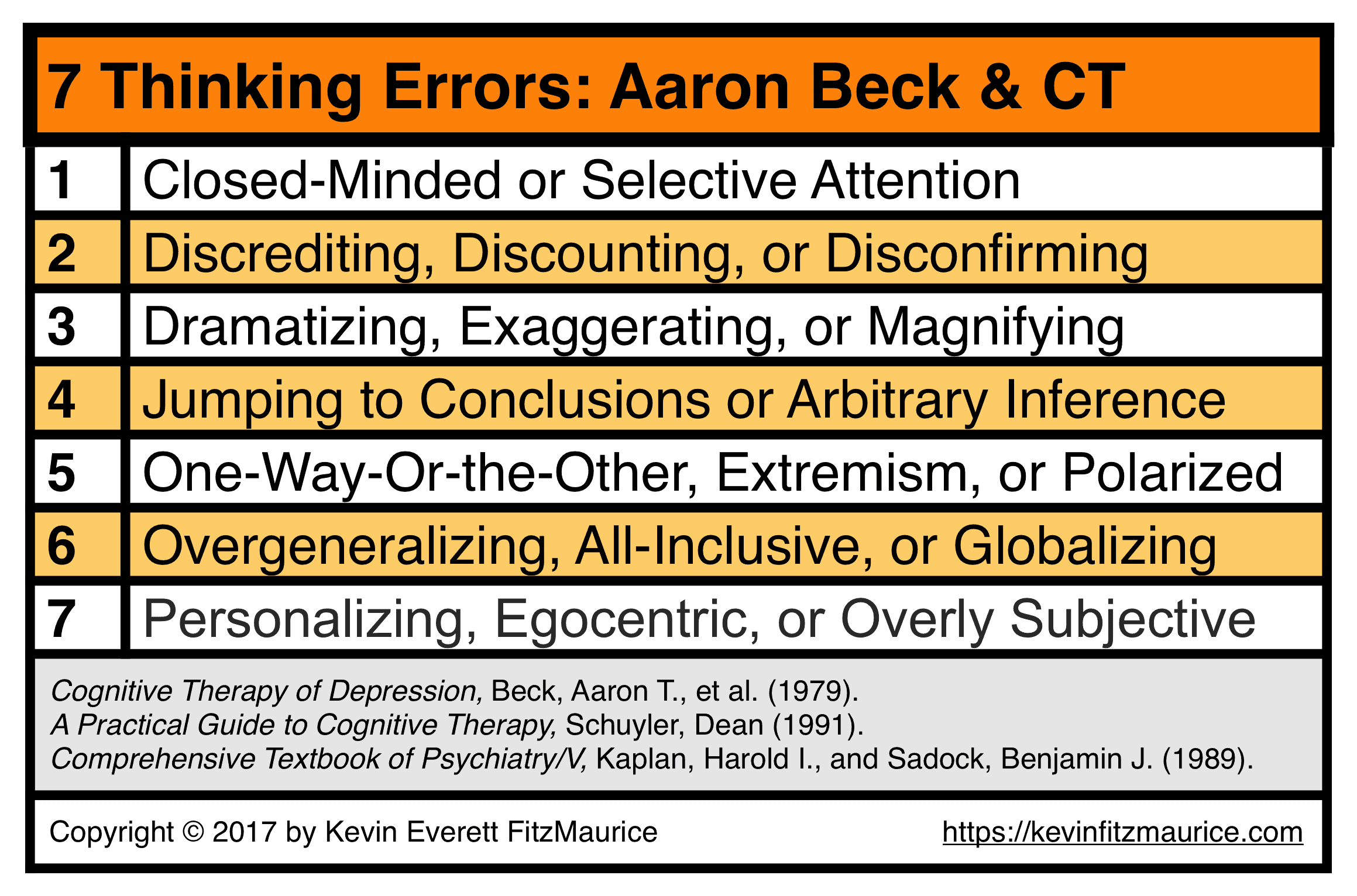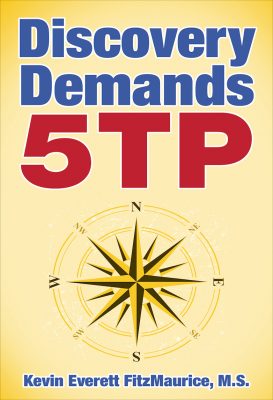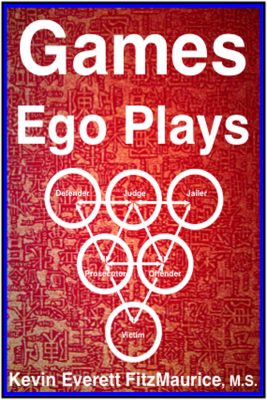7 Errors in Thinking Method: Aaron T. Beck
- Garden will teach you an easy and effective Cognitive Behavioral Therapy (CBT & REBT) system.
7 Errors in Thinking Method from Cognitive Therapy (CT) will help you to reduce and eliminate falsehood in your life for better results overall.
- Read and discover the best understanding of the relationship between feelings and thoughts.
7 Errors in Thinking Method: Table Version

7 Errors in Thinking Method: Sources
- Derived from the following three sources.
- Beck, Aaron T., Rush, A. John, Shaw, Brian F., and Gary Emery. Cognitive Therapy of Depression: A Treatment Manual. Guilford Press, New York. (1979)
- Kaplan, Harold I., and Benjamin J. Sadock. Comprehensive Textbook of Psychiatry/V. Williams & Wilkins, Baltimore, Maryland. (1989)
- Schyler, Dean. A Practical Guide to Cognitive Therapy. W. W. Norton & Company, Inc. New York. (1991)
- All list the same seven with different wording.
- Read and discover the best understanding of feelings and thoughts.
Beck’s Attack on Dualism: 7 Errors in Thinking
- Beck’s 7 errors in thinking method can all be understood as attacks on dualistic thinking or duality itself.
- Each of Beck’s 7 errors is about either an aspect of dualism or a manifestation or result of dualistic thinking styles.
- Beck’s One-Way-Or-The-Other and Overgeneralizing are directly about dualistic thinking.
- The other 5 are about thinking habits, methods, and styles that result from black-and-white or dualistic thinking.
“Dichotomies exist in thinking and choices, for example, ‘Will you turn the lights on or off?’ The thinking error of black-and-white thinking occurs when you force dichotomous thinking and choices where a variety exists.” —Kevin Everett FitzMaurice
Move Beyond Dualtiy Now: 7 Errors in Thinking Method
- Discover a diagram of triality: Diagram of Triality
- Read about triality: World Within: The Inner Life
- Find more on the 5TP: 5 Thinking Positions (5TP): List Pages
- Read Discovery Demands 5TP to learn to use the 5TP
- Read and discover the best reasons to focus on your intention.
7 Errors in Thinking Method: From Cognitive Therapy (CT)
- Closed-minded, Discrediting, Dramatizing, Jumping to Conclusions, One-Way-Or-The-Other, Overgeneralizing, Personalizing.
1) CLOSED-MINDED
- Also called selective editing, selective attention, selective perception, selective abstracting, specific abstracting, mental filtering, mental editing, preferential selection, a cognitive bias, impaired abstract reasoning, ignoring, tunnel vision, being in a closed system, being closed to investigation or examination, “taking things out of context,” “having blinders on,” “seeing through rose-colored glasses,” “tailoring the facts to fit,” “hearing only what you want to hear,” and “seeing only what you want to see.”
- This is the choice of only some of your cognitions for conscious processing and, usually, just the good or bad.
- It can be basing the whole on only one or a few details while ignoring more important or other existing facts.
- For example, you may have a negative bias. Thus, you find the negative, the fault, the error to focus on so that you can maintain your negative evaluations.
- Twenty good things may have happened, but you consciously notice only one or two negative things.
- Or you may be Pollyannaish and notice only a few good things while ignoring the many bad.
- Read and master the life skill of perspective-taking using the best system ever: the 5TP.
7 Errors in Thinking Method
2) DISCREDITING
- Also known as discounting, disqualifying, disconfirming, minimizing, undergeneralizing, the “binocular trick,” being myopic or shortsighted, “missing the big picture,” and “missing the forest for the trees.”
- This is the error of reducing a lot of evidence to a little.
- For example, we can do this when we deny our compliments, achievements, and good qualities.
- Or when we deny our faults, failings, and frailties.
- It is the error of under-regarding the relative significance of events.
- Its opposite is dramatizing.
- Instead, consider other views.
- Instead, practice the skill of perspective-taking.
- Read and master the life skill of perspective-taking using the best system ever: the 5TP.
7 Errors in Thinking Method
3) DRAMATIZING
- Also known as magnifying, exaggerating, awfulizing, catastrophizing, sensationalizing, “making the news newsworthy,” “taking things too seriously,” “making a federal case out of it,” “blowing things out of proportion,” and “making mountains out of molehills.”
- It is “missing the trees for the forest,” “seeing only the big picture,” or being presbyopic or hypermetropic.
- Catastrophizing occurs when you make too much of an event and imagine doom and gloom resulting from it.
- For example, you may believe that your insignificant error will cause you to be fired.
- We can also sensationalize events to be good omens, harbingers of good fortune when they are no more than ordinary events.
- For example, you may believe that some small thing you did well will get you promoted.
- It is the error of over-regarding evidence or events’ relative importance or meaning.
- Its opposite is discrediting.
- Instead, reality test the predictions. Keep track of their accuracy. What are the results?
- Read and master the life skill of perspective-taking using the best system ever: the 5TP.
7 Errors in Thinking Method
4) JUMPING TO CONCLUSIONS
- Also known as mind reading, fortune telling, assuming, just guessing, making arbitrary conclusions, making an invalid extrapolation, and making an arbitrary inference.
- It is the making of an inference about something that has little or no evidence to support it.
- We may assume that something will occur only to find out later that it had little or no chance to.
- It makes conclusions without much data to support them, even in the face of greater contrary evidence.
- Instead, try other perspectives.
- Read and master the life skill of perspective-taking using the best system ever: the 5TP.
7 Errors in Thinking Method
5) ONE-WAY-OR-THE-OTHER
- Also called absolutistic, extremist, dichotomous, polarized, dualistic, judgmental, linear, one-dimensional, pigeonhole, either-or, all-or-nothing, and black-or-white thinking. It is thinking in categorical extremes, placing all of an experience into one of two categories.
- Extremist thinking can be characterized as the intolerance of ambiguity.
- It leads to the narrowing and constricting of thought pathways and insists on categorizing everything into extremes, into opposites, into one end of some continuum.
- The middle ground and the majority of instances are not recognized. Instead of percentages, it believes only in absolutes.
- Absolutes do occur, but not nearly as often as combinations or variations of them.
- Instead, use both-and thinking.
- Often both ends of a continuum can be applied to the same event and also additional information.
- Things can be good, neutral, bad, or mixes of each.
- Rarely is something a total loss, a total failure.
- Stop pigeonholing and instead note or use the following: gradations in between, moderate, intermediate, middle ground, intermediate-range, some of the time, most of the time, but not all of the time, often, sometimes, a few times, partially, continuous dimensions, shades of gray, not discrete categories, on a continuum, relative rather than absolute standards, complexity, variability, diversity, bell curve, normal curve.
- Read and master the life skill of perspective-taking using the best system ever: the 5TP.
7 Errors in Thinking Method
6) OVERGENERALIZING
- Also called global, broad, nonspecific, diffused, vague, and all-inclusive thinking.
- This is the error of taking a little evidence to be proof of a lot of things: all-izing.
- It is the making of a general rule based only on isolated incidents, only on limited personal experience.
- For example, you may judge your or another’s behavior as always being inadequate if it was only a few times or even just once in the past.
- The classic examples are racism and sexism, for example, “All men are unfeeling brutes.”
- Overgeneralizations are general conclusions about all situations based on limited and unrepresentative sampling or polling. Instead, recognize the individuality and uniqueness of people, places, and things.
- Your experience alone is too little and too narrow to use to make rules, laws, standards, and definitions for most things.
- Walk a mile in someone else’s shoes.
- Read and master the life skill of perspective-taking using the best system ever: the 5TP.
7 Errors in Thinking Method
7) PERSONALIZING
- Also known as being overly subjective, self-centered, the egocentric error, “taking things too personally,” “can’t see past your nose,” and having false ideas of reference.
- This is the self-centered activity of taking events to have personal meaning when they do not.
- It is the self-referencing of events, the connecting of events to yourself when there are no real connections.
- For example, you may overhear a conversation and assume it is about you.
- Or you may think the weather is plotting against you.
- Instead, learn to take the ego out of the picture.
- People are reacting to a lot more in life than just you!
- Get out of yourself and into action.
“Nothing is ever about you because nothing can about you be since you are not things or thoughts. Things and thoughts can be about your ego, self-concepts, and self-images. However, even then, it is your choice to make things and thoughts about your self-esteem or not to take them personally or seriously.” —Kevin Everett FitzMaurice
- Read and discover the best reasons to focus on your intention.
7 Errors in Thinking Method
3D: Daily Dose: 2023
Thinking Errors Defend Self-Constructions: 04-14-2023
We provide one example for each of Beck’s original seven thinking errors as defense mechanisms for self-esteem games.
- “Selective attention is a defense mechanism that allows you to maintain your self-esteem, desires or positions by collecting only supporting evidence.” —Kevin Everett FitzMaurice
- “Discounting is a defense mechanism that allows you to disregard any facts or evidence against your self-esteem desires or positions.” —Kevin Everett FitzMaurice
- “Dramatizing is a defense mechanism that allows you to attack any facts or evidence against your self-esteem desires or positions by viewing them as unacceptable abuse.” —Kevin Everett FitzMaurice
- “Arbitrary inference is a defense mechanism that allows you to make only inferences that support your self-esteem desires or positions.” —Kevin Everett FitzMaurice
- “Polarization is a defense mechanism that allows you to attack any facts or evidence against your self-esteem desires or positions by viewing them as extremist abuses.” —Kevin Everett FitzMaurice
- “Globalizing is a defense mechanism that allows you to attack any facts or evidence against your self-esteem desires or positions by viewing any specific (local) attacks as false global (general) attacks.” —Kevin Everett FitzMaurice
- “Personalizing is a defense mechanism that allows you to take any facts or evidence against your self-esteem desires or positions by viewing them as personal attacks (offensive, racist, sexist, mean).” —Kevin Everett FitzMaurice
- Read and master the life skill of perspective-taking using the best system ever: the 5TP.
Quotations Various Sources
Listed Alphabetically
“A man doesn’t know what he knows until he knows what he doesn’t know.” —Laurence Peter
“All success comes from a combination of implementation and knowledge. Knowledge alone is meaningless without action.” —Brian Koslow
“Dichotomies exist in thinking and choices, for example, ‘Will you turn the lights on or off?’ The thinking error of black-and-white thinking occurs when you force dichotomous thinking and choices where a variety exists.” —Kevin Everett FitzMaurice
“Did you ever stop to think, and forget to start again?” —A. L. Milne (Winnie the Pooh)
“Education is learning what you didn’t know you didn’t know.” —George Boas
“Energy will do anything that can be done in this world.” —Johann Wolfgang von Goethe
“Every man takes the limits of his own field of vision for the limits of the world.” —Arthur Schopenhauer, 1788-1860
“Facts are not truths; they are not conclusions; they are not even premises, but in the nature and parts of premises.” —Samuel Taylor Coleridge
“Facts can’t feel.” —Kevin Everett FitzMaurice
“Facts can’t figure.” —Kevin Everett FitzMaurice
“Facts can’t fix.” —Kevin Everett FitzMaurice
“Few of the many wise apothegms which have been uttered have prevented a single foolish action.” —Thomas B. Macaulay
“I haven’t understood a bar of music in my life, but I have felt it.” —Igor Stravinsky
“I’ll play it first and tell you what it is later.” —Miles Davis
“I’m not sure I want popular opinion on my side–I’ve noticed those with the most opinions often have the fewest facts.” —Bethania McKenstry
“If fifty million people say a foolish thing, it is still a foolish thing.” —Anatole France
“Imagination and fiction make up more than three-quarters of our real life.” —Simone Weil
“It’s [music composition] the most effortless thing in the world because you don’t do anything. I hate to say it like that, but it’s the truth.” —Michael Jackson
“Knowledge can be communicated but not wisdom.” —Herman Hesse, 1877-1962
“Knowledge does not do.” —Kevin Everett FitzMaurice
“Knowledge does not get it.” —Kevin Everett FitzMaurice
“Knowledge has no intelligence.” —Kevin Everett FitzMaurice
“Knowledge is not it.” —Kevin Everett FitzMaurice
“Living is a form of not being sure, not knowing what’s next or how. The moment you know how, you begin to die a little.” —Agnes de Mille
“Most thinking problems come from crossing, mixing, or trying to make two signals into one.” —Kevin Everett FitzMaurice
“Most thinking problems come from crossing, mixing, or trying to be on two channels at the same time.” —Kevin Everett FitzMaurice
“Not everything that can be counted counts, and not everything that counts can be counted.” —Albert Einstein (reported to have been a sign in his office)
“Nothing is ever about you because nothing can about you be since you are not things or thoughts. Things and thoughts can be about your ego, self-concepts, and self-images. However, even then, it is your choice to make things and thoughts about your self-esteem or not to take them personally or seriously.” —Kevin Everett FitzMaurice
“Nothing reaches the intellect before making its appearance in the senses.” —Latin proverb
“Nothing that is worth knowing can be taught.” —Oscar Wilde, 1854-1900
“Often the hands will solve a mystery that the intellect has struggled with in vain.” —Carl G. Jung
“Real knowledge is to know the extent of one’s ignorance.” —Confucius
“Scientist is the term given to the kind of fool who tries to prove matter over mind.” —Kevin Everett FitzMaurice
“Surely love has nothing to do with the mind, it is not the product of the mind; love is entirely independent of calculation, of thought.” —J. Krishnamurti, The Collected Works of J. Krishnamurti, Volume V, p. 99
“The field of consciousness is tiny. It accepts only one problem at a time.” —Antoine de Saint-Exupery
“The great man is he who does not lose his child-heart.” —Mencius
“The intellect is not the means of creation, and creation does not take place through the functioning of the intellect; on the contrary, there is creation when the intellect is silent.” —J. Krishnamurti, The Collected Works of J. Krishnamurti, Volume V, p. 97
“The world is governed more by appearance than realities so that it is fully as necessary to seem to know something as to know it.” —Daniel Webster
“The worst extreme view is the extreme view that extremes never exist.” —Kevin Everett FitzMaurice
“There are no rules. Just follow your heart.” —Robin Williams
“To be absolutely certain about something, one must know everything, or nothing, about it.” —Olin Miller
“To think too long about doing a thing often becomes its undoing.” —Eva Young
“We can be absolutely certain only about things we do not understand.” —Eric Hoffer
“We never do anything well until we cease to think about the manner of doing it.” —William Hazlitt, 1778-1830
“What we see depends mainly on what we look for.” —John Lubbock
“When words leave off, music begins.” —Heinrich Heine
“You can’t depend on your eyes when your imagination is out of focus.” —Mark Twain
“You cannot plow a field by turning it over in your mind.” —Anonymous
“You cannot think and hit at the same time.” —Yogi Berra
- Read and master the life skill of perspective-taking using the best system ever: the 5TP.
Related Pages of Free Information
- 5 Thinking Positions (5TP)
- 9 Causes of Everyday Madness or Neurosis
- 9 Fundamental Thinking Errors
- Both-And Skill
- CBT, CT, & REBT Cognitive Psychotherapies: List Pages
- Coping Skills: Free Help
- Counseling Issues: Free Help
- Ego & Self-Esteem Fast-Facts
- Emotional Responsibility: List Pages
- Exercises & Techniques: List Pages
- Feelings & Coping: Fast-Facts
- Limitations of Thought & Thinking
- Meditation: List Pages
- REBT (Rational Emotive Behavior Therapy): List Pages
- REBT’s 11 Irrational Beliefs
- Self-Esteem Issues: List Pages
- Test Your Thinking
- Thinking Skills: Free Help
- Ukraine System for Simplified CBT
- Unconditional Self-Esteem (USE): Defined
- Read and discover the best diagrams and maps of how people play games with your mind and heart.
- Read and master the life skill of acceptance using the best combination of CBT, REBT, & Stoicism.
- Read and master the life skill of perspective-taking using the best system ever: the 5TP.
6 Groups of Topics Menu
- 1. Pages by Topic
- 2. Fast-Facts by Topic
- 3. Quotations by Topic
- 4. Poems by Topic
- 5. Scripture by Topic
- 6. Websites by Topic
- Read and master the life skill of acceptance using the best combination of CBT, REBT, & Stoicism.
- Read and master the life skill of perspective-taking using the best system ever: the 5TP.
10 Skills & Topics Menu
- 1. Coping Skills & Topics
- 2. Problem-Solving Skills & Topics
- 3. Communication Skills & Topics
- 4. Recovery Skills & Topics
- 5. Anger Skills & Topics
- 6. Blame Skills & Topics
- 7. Thinking Skills & Topics
- 8. Responsibility Skills & Topics
- 9. Counseling Skills & Topics
- 10. Praying Skills & Topics
- Read and master the life skill of acceptance using the best combination of CBT, REBT, & Stoicism.
- Read and master the life skill of perspective-taking using the best system ever: the 5TP.



